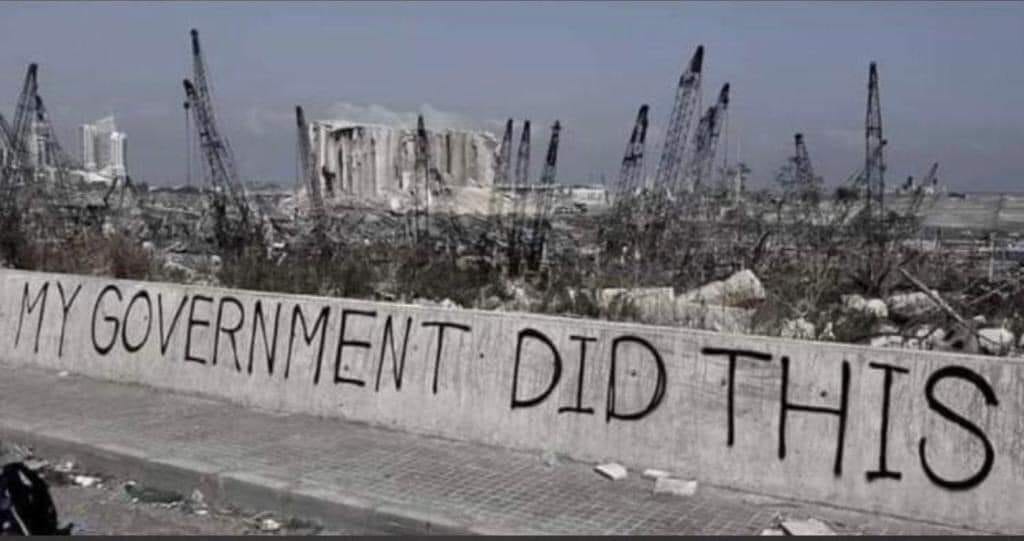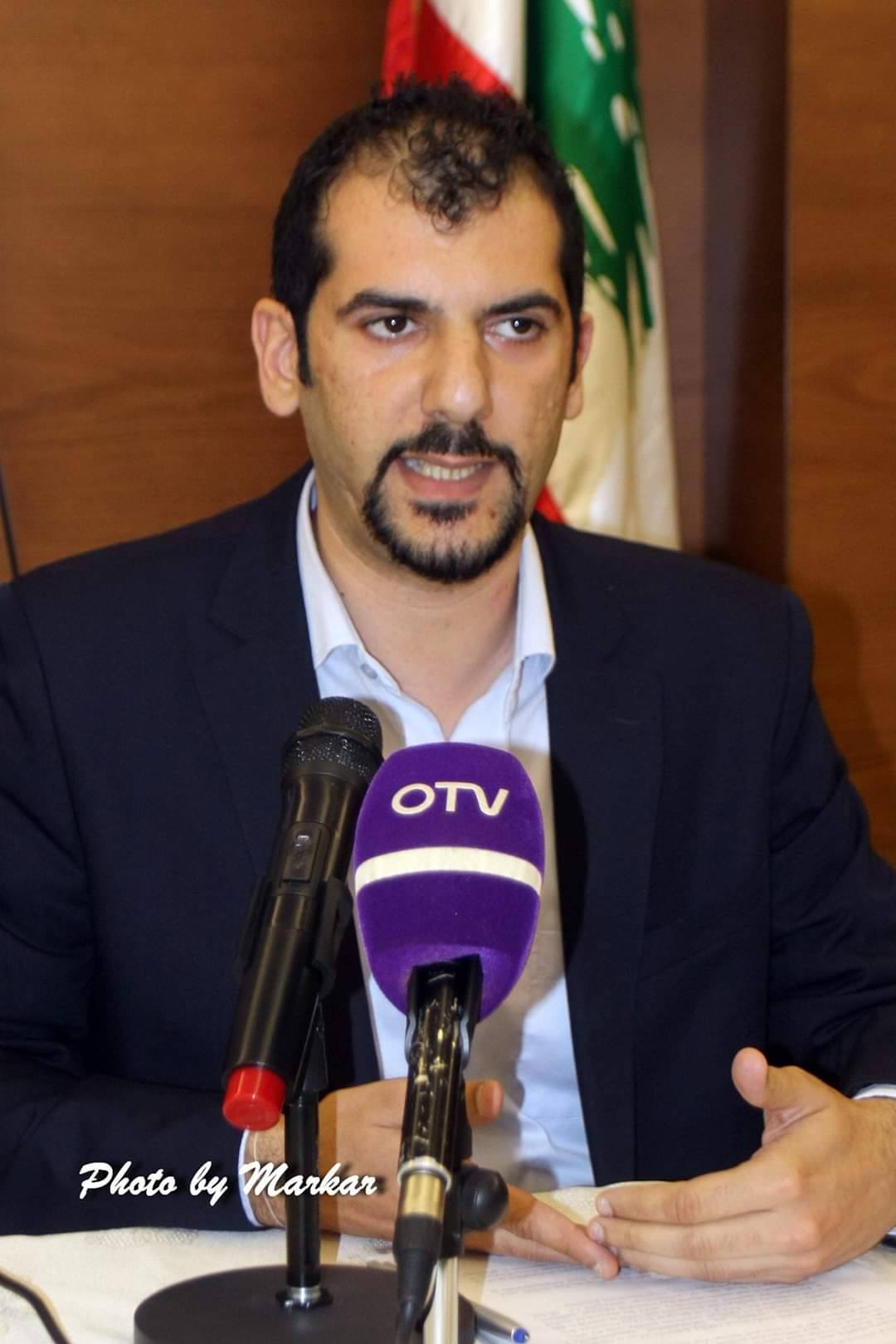 Tuesday, August 4, 2020, 6:10 pm …a day that not a single son or daughter of Lebanon would forget. I was sitting on the balcony with my father, attending a virtual summer school program, as we suddenly heard the sound of an explosion. It was not very strong. My father looked at the sky. I took off my headphones just to check what happened. My eyes caught smoke. It was black smoke coming from the eastern side of our building. I thought it was an assassination or something…seconds later another explosion and after five seconds another as the building shook, windows broke and we started to hear shouting. For a moment, I thought Israeli jets bombed our neighborhood or there was a terror attack next to our building. It was smoke. I couldn’t identify whether the target was in Achrafieh or Bourj Hammoud, but everywhere was smoke. My mom was in panic, and my dad was in a hysterical situation. The wall behind him saved his life; otherwise, the pressure would have thrown him off the balcony. We were safe but all traumatized. I called my relatives, friends and the ARF chapter of our neighborhood. Most calls were not being answered. I went to the street to check what had happened. It was a nightmare. Windows and doors were broken and shattered. People were terrified and crying. There was blood in the streets. It was a war zone.
Tuesday, August 4, 2020, 6:10 pm …a day that not a single son or daughter of Lebanon would forget. I was sitting on the balcony with my father, attending a virtual summer school program, as we suddenly heard the sound of an explosion. It was not very strong. My father looked at the sky. I took off my headphones just to check what happened. My eyes caught smoke. It was black smoke coming from the eastern side of our building. I thought it was an assassination or something…seconds later another explosion and after five seconds another as the building shook, windows broke and we started to hear shouting. For a moment, I thought Israeli jets bombed our neighborhood or there was a terror attack next to our building. It was smoke. I couldn’t identify whether the target was in Achrafieh or Bourj Hammoud, but everywhere was smoke. My mom was in panic, and my dad was in a hysterical situation. The wall behind him saved his life; otherwise, the pressure would have thrown him off the balcony. We were safe but all traumatized. I called my relatives, friends and the ARF chapter of our neighborhood. Most calls were not being answered. I went to the street to check what had happened. It was a nightmare. Windows and doors were broken and shattered. People were terrified and crying. There was blood in the streets. It was a war zone.
I will never forget this scene. I was unable to sleep for 48 hours, but I was not alone. Millions of Lebanese were traumatized also. More than 5,000 people were injured. More than 150 innocent people lost their lives, and still missing corpses are being found under ruined buildings. Our lives were taken away. The Lebanese people who have been witnessing and experiencing economic disaster for the past eight months, now have seen its port – Beirut port – destroyed. The port which controls 80-percent of the country’s trade has been leveled.
We still do not know the truth, and I am not sure if one day anyone will tell us the truth. For a moment, we thought it was an Israeli strike against Hezbollah ammunition, then we started to hear that our state was hiding 2,750 tons of highly explosive ammonium nitrate that had been stored for the preceding six years at a depot at the port. Why was the state hiding such a thing from us? One thing was clear: up to 300,000 people may have been rendered homeless, according to Beirut City Governor Marwan Abboud. Damage estimates are in the billions of dollars, some estimates reaching $15 billion.
For me one thing was clear: our state was responsible and has destroyed us. It robbed us of our youthfulness, our memories and our dreams. It was not surprising that the Beirut port has been nicknamed the “Cave of Ali Baba and the 40 Thieves” due to longstanding reports of corruption, including evasion of customs duties due to bribery schemes and the undervaluation of imports.
The next day I went to the Armenian neighborhoods and walked the heavily populated Armenia Street, one of the longest streets in Beirut, all the way from Bourj Hammoud to the end of Gemmayzeh, the cultural and cosmopolitan heart of Beirut. I saw only damage and pain, thousands of volunteers helping needy people and cleaning the mess; all I heard was the sound of broken glass. Shops are destroyed. Buildings have collapsed, but each corner of the street has a memory for us. Each corner was telling me its story as if the stones were crying. I passed by each pub and restaurant I used to visit and I remembered. I remembered the places where I used to drink, laugh and dance with friends, the place where I first fell in love and had my first crush, all were razed to the ground.
Beirut will never return to what it was before August 4; its flavor has been vanquished. Now it is full of sorrow and agony. My tears were endless, but mostly my heart was broken, not by what I saw…but what I felt deep inside.
Deep inside I felt a sense of revenge, not by the pain inflicted in my community, but by the physical and psychological damage done to my country. Nevertheless, a wind of change was coming…
On the 6th of August, French President Emmanuel Macron made a surprise visit to Lebanon, and he met with the authorities and politicians. Macron walked in Gemmayzeh and visited the damaged areas and met with the people. The French took the initiative to mobilize international aid to Lebanon. Moreover, reports claimed that the French were drafting a political deal with the Iranians to stabilize Lebanon. Ankara also flexed its muscles. The Turkish Vice President and Foreign Minister visited Beirut and expressed their readiness to reconstruct the port of Beirut. The geopolitical and energy security clash in the Eastern Mediterranean between Turkey and France may reflect on Lebanon. Moreover, the arrival of French military aircraft and ships to the port of Beirut may provide Ankara the pretext for direct political intervention in Lebanon via the gates of the port of Tripoli in Northern Lebanon. Lebanon is facing an existential threat as the political and economic systems are crumbling, and regional actors are trying to reshape Lebanon’s future for the coming years.
However, all these efforts will not bring back either our memories or the Beirut that we once fell in love with. Lebanon is decomposing, and the tiny hope that we have in our hearts is now dependent on foreign actors as the local players lost the political will to bring any reform to a corrupt system.



Thku Yeghia. Very touching. Continue your hard work.
Annie
🙏🏽🙏🏽🙏🏽🙏🏽🙏🏽🙏🏽🙏🏽
It’s always worth mentioning how the US rigged Lebanon’s 1958 election to ensure that the Christian faction would win, causing an uprising. The country’s 1975-90 civil war became a proxy war between Israel and Syria, culminating with the Falangists’ massacre of Palestinian refugees in Sabra and Shatilla while a contingent led by Ariel Sharon watched and did nothing.